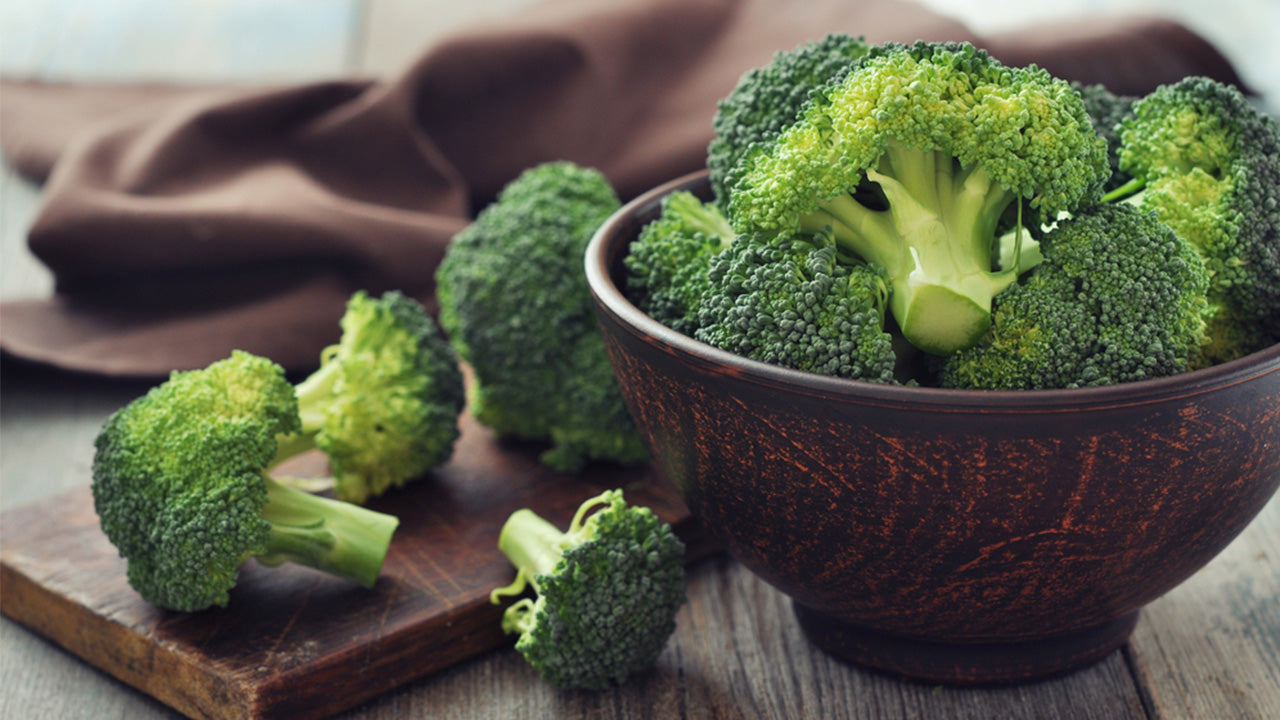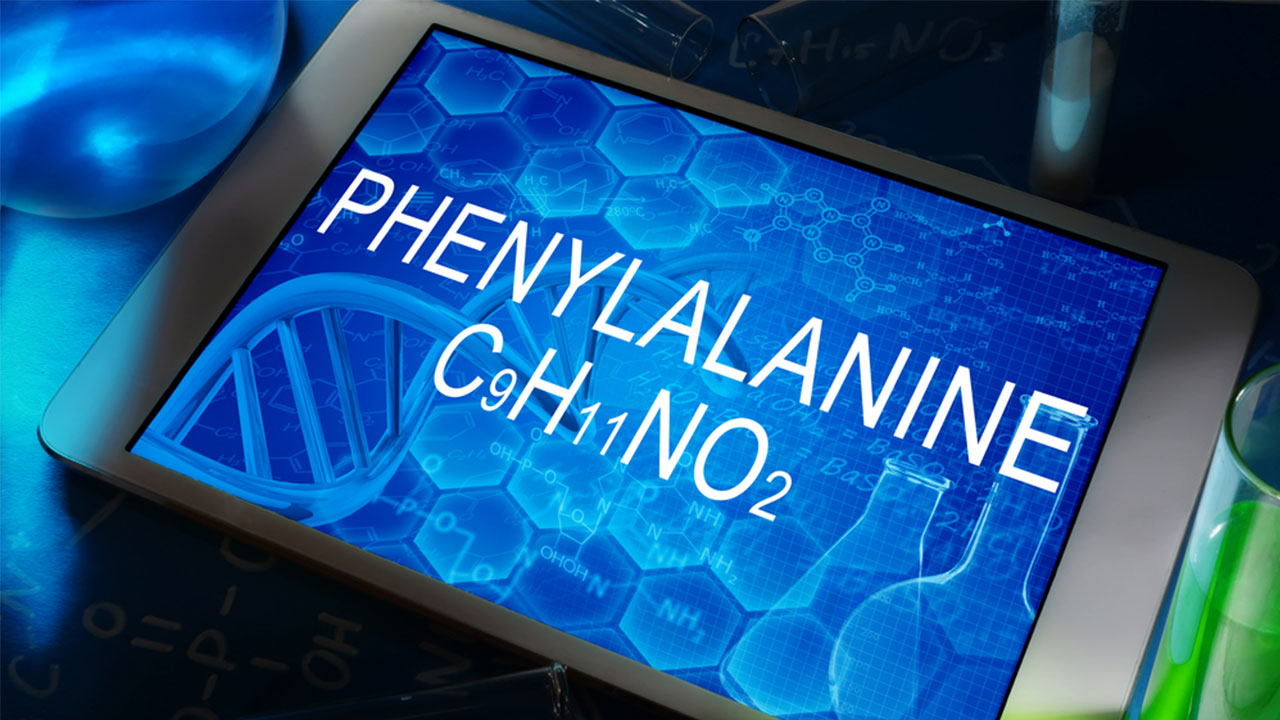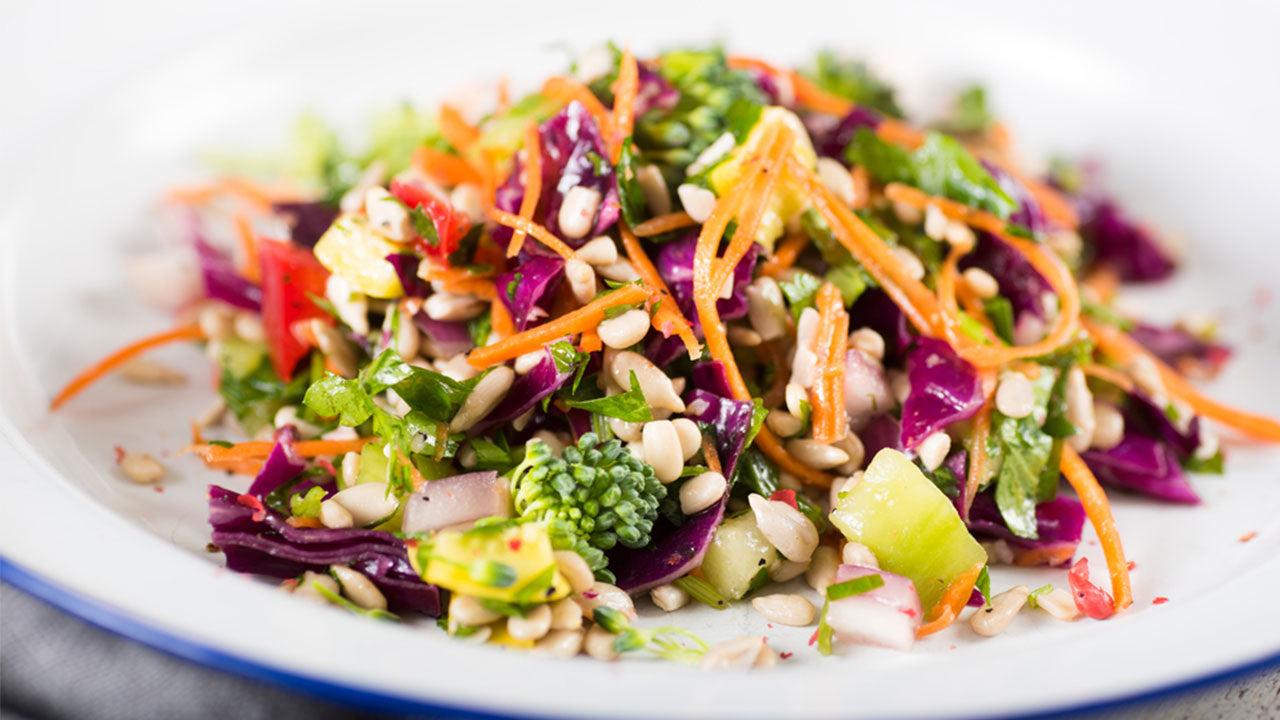What's the Connection Between Broccoli and Cancer Prevention?
 By: by Amino Science
By: by Amino Science

Your mom was really onto something when she insisted that you eat your broccoli. According to the American Institute for Cancer Research and the World Cancer Research Fund (AICR/WCRF), high-quality research has linked broccoli and the bioactive compounds it contains to cancer prevention. When it comes to broccoli and cancer prevention, a systematic review of available scientific research from around the globe led the AICR/WCRF to conclude that broccoli can “convincingly” lower your risk of colorectal cancer and “probably” lower your risk of cancers of the mouth, pharynx, larynx, and lungs too.
In this article, we probe the connection between broccoli and cancer prevention, why you may want should seek out broccoli’s lesser-known younger relative instead, and the best way to prepare this cruciferous vegetable to enjoy the full anti-cancer benefits of broccoli.

Exciting Scientific Findings on Broccoli and Cancer Prevention
As you may know, cruciferous vegetables have long been identified as anti-cancer foods. Broccoli and the other members of the cruciferous family contain a wealth of compounds that can help to prevent cancer as well as to halt its progression.
A group of particularly well-studied compounds, glucosinolates, have been shown to decrease inflammation, a known cancer risk factor. They also inhibit enzymes in the body that activate carcinogens and stimulate enzymes that deactivate them. Plus, they appear to “switch on” the genes that suppress tumors, slow cancer cell growth, and stimulate apoptosis, a process in which cancer cells essentially self-destruct.
One of the most exciting studies to date on broccoli and cancer prevention was conducted by a research team at the Linus Pauling Institute at Oregon State University. The researchers found that sulforaphane, a compound created when an enzyme called myrosinase mixes with a glucosinolate called glucoraphanin, has impressively strong anti-cancer effects.
Emily Ho, a member of the research team and an assistant professor in the Department of Nutrition and Exercise Sciences at OSU, specializes in researching the dietary prevention of cancer. Ho and her colleagues at the Linus Pauling Institute found that broccoli has the highest amount of sulforaphane of all cruciferous vegetables, meaning it could play a major role in the prevention of cancer.
In an interview about the study results, Ho discussed how a class of drugs called histone deacetylase (HDAC) inhibitors are being studied for their potential as cancer-preventing treatments. The results of Ho and her colleagues’ research suggests that eating cruciferous vegetables inhibits HDAC just as effectively as that class of cancer drugs currently under development. “The compound in broccoli may be one of the strongest anti-cancer fighters we have,” Ho said.
“I would say if you’re at all worried about cancer or at high risk of cancer, especially of prostate or colon cancer, then increasing your dietary intake of broccoli and other vegetables could be a good idea,” Ho said. “It certainly can’t hurt. And drugs can have negative side effects and be difficult to administer.”
She personally makes it a goal to eat two servings of cruciferous vegetables daily, though she says she and her fellow scientists have yet to identify an optimal serving size for cancer prevention.
The Case for Trying Broccoli Sprouts
While the answer to the question “Is broccoli healthy for your body?” is clearly yes, broccoli’s more obscure offshoots may be even better for you, especially when it comes to preventing cancer.

The Linus Pauling Institute research team found that young, tender broccoli sprouts contain 50 times the amount of sulforaphane found in mature broccoli. Eating a small sprinkling of broccoli sprouts on top of a bagel with cream cheese inhibited HDAC, which indicates that you only need to eat a small amount of the sprouts to benefit significantly from the anti-cancer compounds they contain.
Separate findings from a group of scientists at Johns Hopkins showed that a daily serving of broccoli sprouts can prevent the growth of Helicobacter pylori (H. pylori), a bacteria known to lead to the development of gastritis, ulcers, and stomach cancer. Eating broccoli sprouts lowered levels of a marker that indicates the presence of H. pylori by 40%, which substantially reduces your risk of developing diseases associated with the bacteria. When researchers re-tested for levels of that marker eight weeks after the study’s conclusion, at which time participants were no longer eating the sprouts, they found they had returned to pre-treatment levels, making it clear that the change was linked to sprout consumption and that ongoing consumption is needed for the protective effect to endure.
While you can find broccoli sprouts at some grocery stores, growing your own will be less expensive and give you the best shot for eating them during the time in which they’re at peak nutrient density—after five days of growth.
How to Cook Broccoli to Preserve Its Nutrient Content
Is it ok to boil broccoli? Yes, but that’s not necessarily the best way to prepare it. For broccoli, as for all fruits and vegetables, the cooking method you choose will alter the nutrient content. In some cases, it diminishes them, but in others, it can actually make them easier for your body to absorb and utilize. No single cooking method is best, nor is it always best to eat your vegetables raw.
When it comes to maximizing the sulforaphane content in broccoli, however, there’s good evidence to back one specific approach: steaming.

For a research paper published in Phytochemistry, scientists experimented with cooking broccoli at different temperatures and for varying lengths of time to see how that impacted sulforaphane levels. They learned that heating the broccoli for a short time yielded the highest levels of sulforaphane. Reportedly, the best way to replicate their results at home would be to steam broccoli lightly for between three and four minutes.
There’s some evidence to suggest that cooking broccoli sprouts increases their sulforaphane content too, but it will likely make eating them far less pleasant, and their concentrations are so high when raw that it’s really not necessary.
Looking for additional ways to boost your health and help protect against chronic illnesses like cancer? Look no further than Amino Co essential amino acid formulas, designed for the world's most common health concerns.

Up to 25% off Amino
Shop NowTAGS: food
Join the Community
Comments (0)
Most Craveable Recipes




 833-264-6620
833-264-6620



















